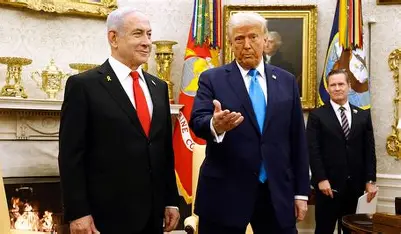WASHINGTON — President Donald Trump has publicly affirmed his full support for Israeli Prime Minister Benjamin Netanyahu’s prosecution of the war in Gaza, highlighting a sharp divergence from the approach of many Democratic leaders. Trump’s pro-Israel stance reflects a broader political strategy designed to energize his core base of conservative and evangelical voters, even as he has voiced frustration that American Jews have not sufficiently recognized his positions on Middle East policy.
The White House meeting between Trump and Netanyahu on Monday underscored this alignment. During the high-profile summit, Trump unveiled a multipart peace proposal aimed at ending the Gaza conflict. Netanyahu expressed acceptance of the deal, which reportedly includes phased ceasefire terms and the release of hostages held by Hamas. However, significant obstacles remain. With 22 hostages still in captivity, Hamas has stated conditional acceptance of the deal and called for further negotiations on unresolved terms. This leaves the peace process in a precarious position.
A recent Washington Post poll underscores growing divisions within the American Jewish community regarding Israel’s military conduct in Gaza. The poll found that 61 percent of American Jews believe Israel has committed war crimes, while nearly 40 percent assert that Israel is guilty of genocide against Palestinians. These figures reflect a historic shift in opinion, given the traditionally strong ties between the U.S. Jewish community and Israel.
The term “genocide,” coined in 1944 following the Holocaust, describes acts committed with intent to destroy, in whole or in part, a national, ethnic, racial, or religious group. For many Zionist leaders in 1948, the founding of Israel was seen as an enduring safeguard against atrocities like the Holocaust. Yet today, accusations that Israel is committing genocide — reiterated recently by a United Nations expert panel , have provoked intense debate within Jewish communities globally and within Israel itself. Netanyahu’s government rejects this characterization, framing its military campaign as a necessary defensive response to Hamas’ October 7, 2023 attack on Israeli territory.
The poll found 39 percent of American Jews agreeing with the genocide claim, while 51 percent rejected it and 10 percent were undecided. This division reflects deep moral and political tensions in a community wrestling with questions of loyalty, identity, and justice amid an intensifying conflict.
For some American Jews, the label “genocide” is deeply troubling. Dana Witten, a 59-year-old Boston resident, said: “The Israelis are clearly not trying to eliminate all Palestinians the way the Nazis sought to erase every Jew. To call it genocide is a false equivalence. It demeans the suffering of the Jewish people and harms discourse. It’s craziness to say it’s genocide.”
Others are less certain. Julia Seidman, a writer from Issaquah, Washington, said the issue has sparked repeated debates in her own household. “My husband and I have had repeated disagreements about this,” she said. “He believes you shouldn’t use the word unless it absolutely meets the textbook definition. It’s not because he thinks what is going on is excusable; it’s certainly not. But if we muddy the waters by calling it genocide when it’s not, we risk losing moral authority. I am much less certain about that.”
These diverging views illustrate how the Gaza war has deepened fractures within the American Jewish community, raising profound questions about Israel’s actions and the moral boundaries of armed conflict.
Political analysts argue that President Trump’s staunch support for Netanyahu is a calculated move to strengthen his standing among evangelical Christians and conservative voters ahead of the next election cycle. By positioning himself as a defender of Israel and a broker of peace, Trump reinforces his foreign policy identity while appealing to a core segment of his electorate.
Yet Trump’s position may complicate his relationship with American Jews, many of whom have become critical of Netanyahu’s policies in Gaza. Trump has previously expressed frustration that parts of the Jewish community have not shown adequate appreciation for his Middle East initiatives, framing his unwavering support for Israel as central to his political brand.
The growing divide over Gaza — both within American Jewry and in Israel itself — could have profound implications for U.S.-Israel relations. Rising criticism from Democratic leaders and shifting public sentiment in the U.S. may compel Washington to reconsider its policy approach toward Israel.
For Netanyahu, Trump’s backing represents a critical international lifeline, bolstering his political position even as he faces mounting scrutiny over Israel’s military conduct in Gaza. For Trump, the alliance offers a strategic opportunity to cement his leadership role in Middle East diplomacy while shoring up political support at home.
The question of whether Israel’s actions in Gaza constitute genocide is not simply a legal matter; it is a moral and political question that touches on history, international law, and national identity. For American Jews, it strikes at the core of their relationship with Israel. For the United States, it could reshape the contours of foreign policy and alliance-building in the Middle East for years to come.
As peace negotiations over Gaza continue and debates over the genocide question intensify, the conflict has become a defining moment in modern geopolitics. How it is resolved will not only influence the future of U.S.-Israel relations but will leave lasting impacts on global Jewish identity and the discourse surrounding human rights and war.



